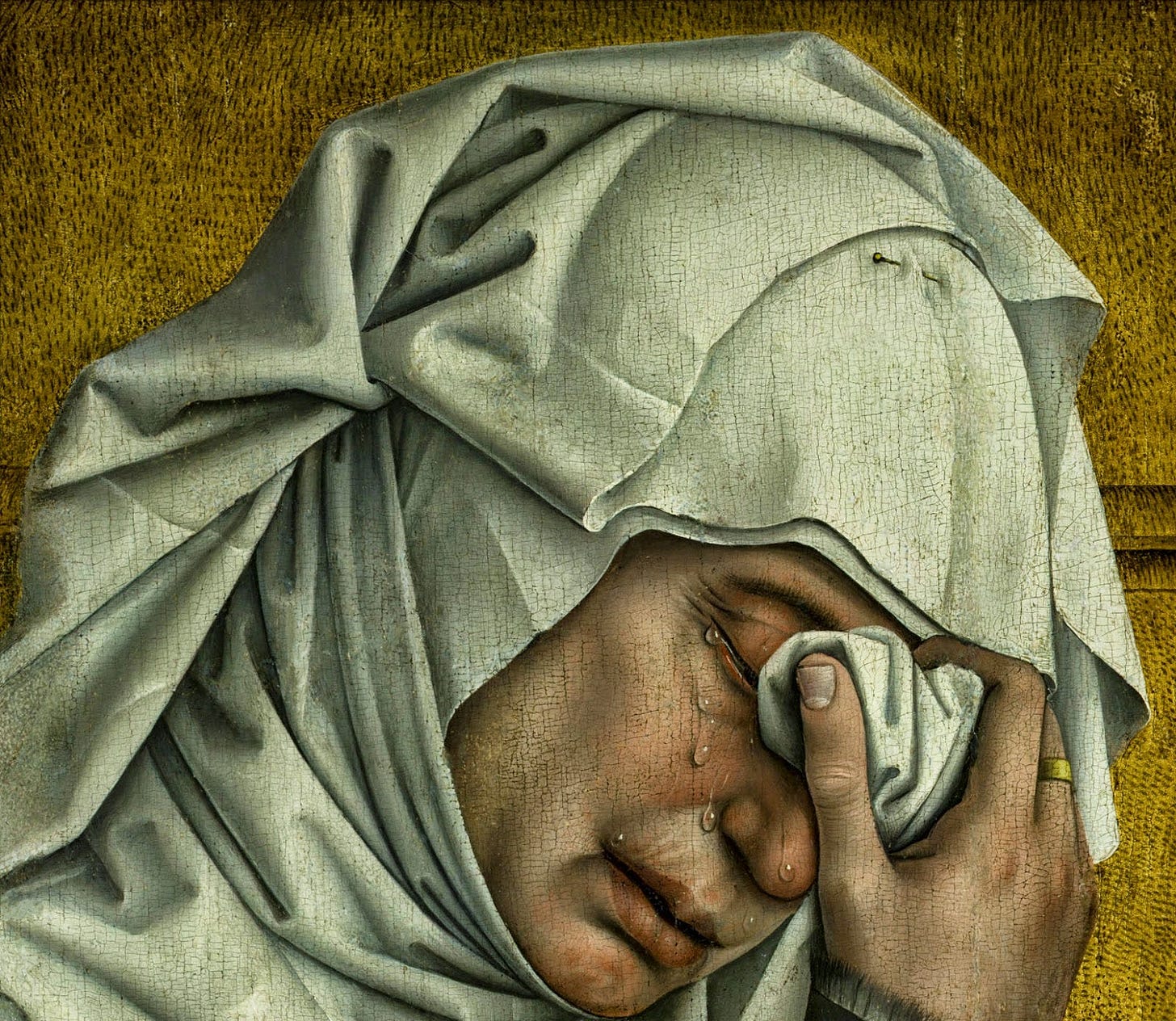
Shell Shocked
In 1992, during the siege of Sarajevo in the Bosnian War, a young reporter visited a makeshift hospital where women, some widowed and some just waiting, lined the corridor. One woman stood out—not because she was weeping, but because she wasn’t. She sat upright, hands clenched in her lap, face blank, eyes forward.
When asked if she needed anything, she didn’t even look up.
She said, “I don’t sit down. If I sit down, I will never get up again.”
Her husband had been killed. Her sons were missing. She hadn’t cried, hadn’t slept, and hadn’t eaten a full meal in days. Nurses tried to bring her food. Other women urged her to lie down. She wouldn’t. She stayed standing. Standing meant she could still carry on. And carrying on meant she didn’t have to grieve.
Although this story is a work of fiction, it undoubtedly mirrors countless true stories from wartime. When struck with grief, we fail to weep. In war, we understand the need to emotionally detach to survive. But stonewalling isn’t just a wartime reflex—it’s a common human response to pain, trial, and guilt. How often have you said or felt these phrases: Tough it out. — Bury it deep. — Suck it up. And because it’s baseball season… Stop crying and rub some dirt on it.
Keening Lament
But Jesus doesn’t say that.
He says, “Blessed are those who mourn, for they will be comforted.” (Matthew 5:4)
The word for “mourn” here is pentheō. It’s not simple sadness. It’s Jacob weeping for Joseph. It’s Jesus in Gethsemane. It’s sorrow so deep it robs you of breath. It was the kind of grief that tore garments and poured ashes. This was no internalized, quiet ache. This was keening lament. Jesus wasn’t blessing the stoic. He was blessing the broken, the loud, the undone.
Jesus is not blessing sorrow for sorrow’s sake. He is blessing a particular kind of mourning. In the Sermon on the Mount, He begins by blessing the poor in spirit—those who know their spiritual poverty. And then He says: mourn. Mourn that poverty. Mourn the fracture sin has caused—in you, in others, in the world.
Paul refers to this as "godly sorrow." Calvin would say this mourning proceeds from a sense of sin and the fear of God. John Murray would call it the reflex of penitent grief. The Westminster Confession (15.2) puts it this way: “By it a sinner… so grieves for, and hates his sins… that he turns from them unto God.”
It’s not despair. It’s not self-loathing. It’s an honest lament that leads to repentance. It’s the cry of a heart that finally sees and hates its sin.
But this mourning is not limited to personal guilt. It stretches outward. It includes weeping for the world's brokenness: violence, injustice, disease, death. It is right to cry over those things. Ecclesiastes 7 even says that mourning refines the heart. When we mourn, Jesus says: You are blessed because comfort is coming.
What kind of comfort? Not distraction. Not a numbing agent. Not “it could be worse” encouragement.
It is parakaleō—comfort. The drawing near of God Himself. The gentle presence of the Spirit, the One Jesus calls the Comforter. It’s the promise of Isaiah 61: that the Messiah will give beauty for ashes, the oil of gladness for mourning, a garment of praise instead of despair.

Inside Out
One of my favorite movies is Pixar’s Inside Out. The lead emotion in young Riley's mind is Joy. She works tirelessly to keep things light. But in the end, it's not Joy that saves Riley’s heart. It's her counterpart, Sadness. Only when Riley allows herself to feel the pain does healing begin. Brilliant.
Like Riley, we can’t truly heal until we stop running from sadness and let ourselves feel the weight of our Sin before a Holy God.
Life-Giving Comfort
Men, I know this is particularly hard for you. We aren’t the crying type—I get that. But hardening and numbing your emotions to feign toughness isn’t working. God’s not impressed with your impassive attitude. It’s okay to mourn over your mistakes and the brokenness of this world. We are not okay. And we shouldn’t pretend to be.
God’s comfort lovingly intertwines with our sadness. So, for those who grieve their sin and for those who feel the weight of the world’s brokenness, know that mourning doesn’t come from despair but from a beautiful hope that God will be there to meet us in our pain.
It’s life-giving to know that I don’t have to manufacture joy. God shows He values our sorrowful state. God never bypasses sorrow, but meets us in it. The people who are most deeply comforted are not the ones who suck it up—they’re the ones who bring their mourning to God.
As Psalm 34:18 reminds us: “The Lord is near to the brokenhearted and saves the crushed in spirit.” His comfort doesn’t erase pain—it redeems it.
“Blessed are those who mourn,” Jesus said. Because their Father will comfort them, and that comfort doesn’t numb the pain—it transforms it.
If you’re ready, join me. Let’s confess our sin together using the prayer provided:
Lord Jesus, we confess our reluctance to mourn. We hide our sorrow and call it strength. But You bless those who grieve what sin has broken. Help us face our guilt and the world’s pain with honesty, and meet us with Your comfort and mercy.
Thanks for praying! God bless you. We’ll read and pray again next Saturday at 8:30 a.m.






Sadness is my favorite.
Great job. I know I hide from pain😩